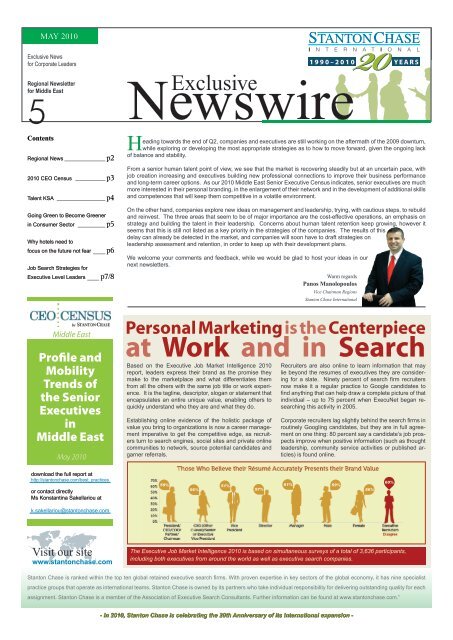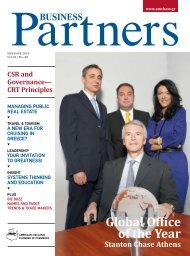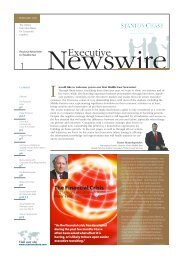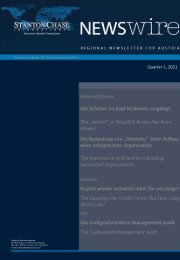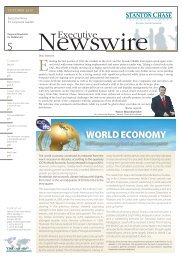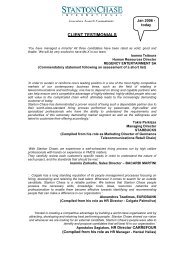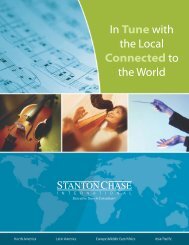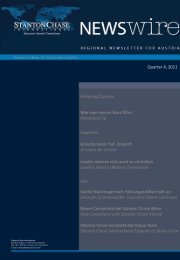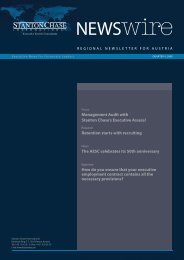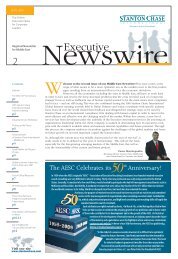Middle East - Stanton Chase International
Middle East - Stanton Chase International
Middle East - Stanton Chase International
Create successful ePaper yourself
Turn your PDF publications into a flip-book with our unique Google optimized e-Paper software.
MAY MAY 2010 2010<br />
Exclusive News<br />
for Corporate Leaders<br />
Regional Newsletter<br />
for <strong>Middle</strong> <strong>East</strong><br />
5<br />
Contents<br />
Regional News p2<br />
2010 CEO Census p3<br />
Talent KSA p4<br />
Going Green to Become Greener<br />
in Consumer Sector p5<br />
Why hotels need to<br />
focus on the future not fear p6<br />
Job Search Strategies for<br />
Executive Level Leaders p7/8<br />
<strong>Middle</strong> <strong>East</strong><br />
Profile and<br />
Mobility<br />
Trends of<br />
the Senior<br />
Executives<br />
in<br />
<strong>Middle</strong> <strong>East</strong><br />
May 2010<br />
download the full report at<br />
http://stantonchase.com/best_practices<br />
or contact directly<br />
Ms Konstantina Sakellariou at<br />
k.sakellariou@stantonchase.com<br />
Visit our site<br />
www.stantonchase.com<br />
STANTON CHASE INTERNATIONAL<br />
Newswire<br />
Exclusive<br />
Exclusive<br />
Newswire<br />
Heading towards the end of Q2, companies and executives are still working on the aftermath of the 2009 downturn,<br />
while exploring or developing the most appropriate strategies as to how to move forward, given the ongoing lack<br />
of balance and stability.<br />
From a senior human talent point of view, we see that the market is recovering steadily but at an uncertain pace, with<br />
job creation increasing and executives building new professional connections to improve their business performance<br />
and long-term career options. As our 2010 <strong>Middle</strong> <strong>East</strong> Senior Executive Census indicates, senior executives are much<br />
more interested in their personal branding, in the enlargement of their network and in the development of additional skills<br />
and competences that will keep them competitive in a volatile environment.<br />
On the other hand, companies explore new ideas on management and leadership, trying, with cautious steps, to rebuild<br />
and reinvest. The three areas that seem to be of major importance are the cost-effective operations, an emphasis on<br />
strategy and building the talent in their leadership. Concerns about human talent retention keep growing, however it<br />
seems that this is still not listed as a key priority in the strategies of the companies. The results of this<br />
delay can already be detected in the market, and companies will soon have to draft strategies on<br />
leadership assessment and retention, in order to keep up with their development plans.<br />
We welcome your comments and feedback, while we would be glad to host your ideas in our<br />
next newsletters.<br />
Personal Marketing is the Centerpiece<br />
at Work and in Search<br />
Based on the Executive Job Market Intelligence 2010<br />
report, leaders express their brand as the promise they<br />
make to the marketplace and what differentiates them<br />
from all the others with the same job title or work experience.<br />
It is the tagline, descriptor, slogan or statement that<br />
encapsulates an entire unique value, enabling others to<br />
quickly understand who they are and what they do.<br />
Establishing online evidence of the holistic package of<br />
value you bring to organizations is now a career management<br />
imperative to get the competitive edge, as recruiters<br />
turn to search engines, social sites and private online<br />
communities to network, source potential candidates and<br />
garner referrals.<br />
59%<br />
56%<br />
51%<br />
Warm regards<br />
Panos Manolopoulos<br />
Vice Chairman Regions<br />
<strong>Stanton</strong> <strong>Chase</strong> <strong>International</strong><br />
Recruiters are also online to learn information that may<br />
lie beyond the resumes of executives they are considering<br />
for a slate. Ninety percent of search firm recruiters<br />
now make it a regular practice to Google candidates to<br />
find anything that can help draw a complete picture of that<br />
individual – up to 75 percent when ExecuNet began researching<br />
this activity in 2005.<br />
Corporate recruiters lag slightly behind the search firms in<br />
routinely Googling candidates, but they are in full agreement<br />
on one thing: 80 percent say a candidate’s job prospects<br />
improve when positive information (such as thought<br />
leadership, community service activities or published articles)<br />
is found online.<br />
The Executive Job Market Intelligence 2010 is based on simultaneous surveys of a total of 3,636 participants,<br />
including both executives from around the world as well as executive search companies.<br />
- In 2010, <strong>Stanton</strong> <strong>Chase</strong> is celebrating the 20th Anniversary of its international expansion -<br />
57%<br />
61% 59%<br />
<strong>Stanton</strong> <strong>Chase</strong> is ranked within the top ten global retained executive search firms. With proven expertise in key sectors of the global economy, it has nine specialist<br />
practice groups that operate as international teams. <strong>Stanton</strong> <strong>Chase</strong> is owned by its partners who take individual responsibility for delivering outstanding quality for each<br />
assignment. <strong>Stanton</strong> <strong>Chase</strong> is a member of the Association of Executive Search Consultants. Further information can be found at www.stantonchase.com.”<br />
56%<br />
60%
MAY 2010<br />
p2<br />
<strong>Stanton</strong> <strong>Chase</strong> <strong>International</strong>:<br />
Celebrating 20 Years<br />
The 20th Anniversary of the global expansion of <strong>Stanton</strong><br />
<strong>Chase</strong> <strong>International</strong> was celebrated on the 26th of April in the<br />
Fort Island of Madinat Jumeirah, in Dubai, with about 200 senior<br />
executives, mostly from the GCC region, attending the special<br />
reception that was hosted by the UAE office of <strong>Stanton</strong> <strong>Chase</strong>.<br />
Dr Panos Manolopoulos, Vice Chairman Regions of <strong>Stanton</strong><br />
<strong>Chase</strong> <strong>International</strong> and Managing Partner of <strong>Stanton</strong> <strong>Chase</strong> UAE<br />
welcomed the guests, presenting in brief the steps of the growth<br />
of <strong>Stanton</strong> <strong>Chase</strong> over the past two decades and focusing on the<br />
importance the company places in building strong and long term<br />
relationships with its partners around the world. Dedication and<br />
wholehearted commitment on being next to the senior executives<br />
and not only acting as commissioned consultants represents the<br />
core of the company’s philosophy and the various activities of its<br />
offices around the world support this mentality.<br />
<strong>Stanton</strong> <strong>Chase</strong> started its global expansion in 1990, thus taking<br />
over the name “<strong>Stanton</strong> <strong>Chase</strong> <strong>International</strong>”. Ever since, the<br />
number of offices has increased exponentially to 70 offices today<br />
in 43 countries around the world.<br />
Collaborations<br />
<strong>Stanton</strong> <strong>Chase</strong> <strong>Middle</strong> <strong>East</strong> and the CEO Clubs UAE have signed a<br />
Memorandum of Understanding in order to initiate a mutual collaboration<br />
on joint initiatives addressed to senior executives in the <strong>Middle</strong> <strong>East</strong>.<br />
STANTON CHASE INTERNATIONAL<br />
Regional News<br />
Exclusive<br />
Newswire<br />
Participation in Conferences<br />
4<strong>Stanton</strong> <strong>Chase</strong> <strong>Middle</strong> <strong>East</strong> supported the 5th Annual HR Strategies<br />
in Oil, Gas & Petrochemicals Conference, held in Doha, 12-14 April<br />
2010. Wassim Karkabi, Managing Partner of <strong>Stanton</strong> <strong>Chase</strong> in Qatar<br />
and UAE and Regional Practice Leader EMEA for the Industrial Sector<br />
acted as a panellist during the conference, focusing on the Role of HR<br />
VISIT OUR WEBSITE:<br />
www.fleminggulf.com<br />
in Preparing for Tomorrow’s Business<br />
12<br />
Challenges.<br />
th - 14th 5<br />
April 2010, W Doha Hotel & Residencies, Qatar<br />
th Annual HR Strategies in Oil,<br />
Gas & Petrochemicals 2010<br />
4<strong>Stanton</strong> <strong>Chase</strong> <strong>Middle</strong> <strong>East</strong> also supported the 2nd HRM Summit, held<br />
OUR DISTINGUISHED SPEAKERS AND PANELISTS<br />
Dr. Richard Leete, General Secretariat for Mundhir Al Barwani, Petroleum<br />
Hamood M. Al-Harthy, Al Rushaid Group,<br />
Development Planning (GSDP) Qatar Development Oman<br />
(Saudi)<br />
Director, Department of Social Development Director HR<br />
Group HR, Manager<br />
in Bahrain, on 4-5 May 2010. Panos Manolopoulos, Stephanie Cox, Schlumberger (France) Shahzad Sadan, Al Vice Hassan Group of Chairman<br />
Dr. Adel Aldosary, King Fahd University<br />
Vice President Human Resources<br />
Companies (Oman)<br />
for Petroleum & Minerals (Saudi)<br />
General Manager - Human Resources and Chairman, City Planning Department<br />
Dr. Axel Bode, Wintershall Group<br />
Administration<br />
(Germany)<br />
Murad Suleiman, FranklinCovey <strong>Middle</strong><br />
Global Director of Human Resources<br />
Abdulkarim Yahya Hilal, Bahrain National <strong>East</strong><br />
Gas Company<br />
General Manager<br />
Eion Turnbull, BAPCO (Bahrain)<br />
Head HR<br />
Dy. Chief Executive Officer<br />
(Pride of HR Profession Award at the Global HR Dr. Parag Diwan, University of Petroleum<br />
Regions of <strong>Stanton</strong> <strong>Chase</strong> <strong>International</strong> and Managing Excellence Awards) Partner & Energy Studies acted<br />
Carel Oberholzer, SABIC, (Saudi Arabia)<br />
Vice Chancellor & Indian School of Petroleum<br />
Global Lead for Organizational Development Hussain Redha, Ministry of Labor,<br />
Secretary General<br />
and Design<br />
Bahrain, former Executive General Manager, Energy Institute (India)<br />
BAPCO (Bahrain), Former GM HR and Admin Chief Operating Officer<br />
Ragner Falck, Qatar Petroleum<br />
Head Strategic Manpower Planning<br />
Ken Nikolai, Abu Dhabi Gas Industries Wassim Karkabi, <strong>Stanton</strong> <strong>Chase</strong> (Qatar &<br />
Division – GASCO (UAE)<br />
UAE)<br />
Abdulrahman Al Tuwaijri, Saudi Aramco<br />
Advisor Human Capability Division<br />
Managing Partner & Regional Practice Leader,<br />
(Saudi Arabia)<br />
as a key note speaker, focusing on “Leadership HRD Consultant in the Age of Industrial, the EMEA ‘New<br />
Bob Gower, Sakhalin Energy Investment<br />
Co. (Russia)<br />
Duncan Freer, Oil & Gas Job Search, (UK)<br />
Khalid M. Al-Buhairan, Saudi Arabian<br />
Deputy HR Director<br />
Managing Director<br />
Chevron (Kuwait)<br />
Human Resources Manager<br />
Ron Villejo, Emirates National Oil<br />
Company Limited (UAE)<br />
Management Trainer Learning & Development<br />
Centre<br />
Normal’”.<br />
Other Events<br />
Official<br />
Endorser:<br />
HOT SPOTS<br />
Qatar’s National Development Strategy 2011-2016: Population, Labour Force and Qatari<br />
Employment – KEYNOTE<br />
Adopt, Adapt & Implement modern HR practises in the Oil, Gas & Petrochemicals sectors:<br />
Delivering Business Objectives through HR Strategy – INTERACTIVE PANEL DISCUSSION<br />
The role of HR in preparing for tomorrow’s business challenges – INTERACTIVE PANEL<br />
DISCUSSION<br />
Coaching and Mentoring young nationals & grooming them as tomorrows leaders – 13th<br />
April 2010<br />
Associate Sponsors: Strategic Hospitality Partner: Knowledge Partner:<br />
4<strong>Stanton</strong> <strong>Chase</strong> <strong>Middle</strong> <strong>East</strong> and the CEO Clubs UAE organized an<br />
exclusive senior executive business breakfast on the 24th of May,<br />
in Dubai, sponsored by S.P. Jain Center of Management, Dubai –<br />
Singapore. The topic discussed was “Globalization 4.0 – The New<br />
Paradigm for CEOs”. Key note speaker: Prof. Michael Barnes,<br />
Dean, Global MBA Program, S.P. Jain Center of Management, Dubai<br />
– Singapore. The event was attended by more than 150 senior<br />
executives from the GCC region.<br />
4On the 17th of May 2010, Panos Manolopoulos, Vice Chairman<br />
Regions of <strong>Stanton</strong> <strong>Chase</strong> <strong>International</strong> and Managing Partner <strong>Middle</strong><br />
<strong>East</strong> acted as key note speaker in S.P. Jain Center of Management,<br />
Dubai – Singapore, within the initiative “Visiting Wisdom and CEO<br />
Quest”.<br />
Silver Sponsor:<br />
Supporting Sponsors:<br />
Co-sponsors:
MAY 2010<br />
p3<br />
STANTON CHASE INTERNATIONAL<br />
<strong>Middle</strong> <strong>East</strong><br />
Profile and Mobility Trends<br />
of the Senior Executives in<br />
<strong>Middle</strong> <strong>East</strong><br />
May 2010<br />
On the break of the new era, characterized by many as “the new<br />
normal”, while having “survived” through the turmoil of the 2009<br />
deep recession, the Senior Executives in the <strong>Middle</strong> <strong>East</strong> begin to<br />
develop the balances and requirements that will allow them to<br />
further advance their career within this volatile environment.<br />
Though last year was mostly the “year of survival”, this year seems to<br />
head towards “development”. The issues and priorities questioned<br />
during 2009 and the values that seemed to become weaker in view of the<br />
depression are now put into scrutiny and urge senior executives to decide<br />
on the next steps in their career. Even from last year, top executives were<br />
beginning to regard <strong>Middle</strong> <strong>East</strong>, and mainly the GCC region, as a market<br />
for long term business development, as opposed to the rather more<br />
opportunistic short-term plans of the past. As such, they had started<br />
questioning quality in general and C-level decision making, raising issues<br />
of personal and career development, shortage in leadership talent as well<br />
as retention of talent in the current GCC environment.<br />
Given the fact that, despite the strong blow and the challenges, the<br />
regional economies emerged as “winners” - compared to other parts of<br />
the world - and still proceed with the regional long-term development<br />
plans, the senior executives seem to feel safe enough to start exploring<br />
professional opportunities, often expressing a dissatisfaction regarding<br />
the managerial decisions and overall culture that emerged through the<br />
2009’s survival policy. As a consequence, development of technical<br />
skills as well as of the personal business network, along with the<br />
need for professional advise and mentoring gain in importance, in<br />
order to allow the executives on one hand to make the next step and, on<br />
the other hand, to face the increasing competition from the still unstable<br />
economies around the world.<br />
Another point that prevails from the above is the need of the companies<br />
as employers to prove their ability to develop an environment that lives<br />
up to the expectations of today’s senior executives, supporting their<br />
Panos Manolopoulos<br />
Exclusive<br />
Newswire<br />
personal and professional growth, while increasing their retention rates.<br />
Regardless of whether the executives are ex-patriats or nationals (as the<br />
last percentage tends to increase, given the on-going nationalization<br />
programs of the <strong>Middle</strong> <strong>East</strong>ern countries), the complexity of their<br />
requirements, combined with the complexity of what is required by<br />
them, shows the way to a era of new leadership that should not be<br />
underestimated. Even though there is a false perception that talent is “in<br />
abundance” due to the recession, the truth is that, despite the increased<br />
competition, competent senior human talent is always scarce to find,<br />
and it will keep being even more difficult. Retention, as well as careful<br />
succession planning, is to become among the top priorities of the<br />
companies that, besides promoting their brand to the clients, would<br />
need to promote their brand to the executive / employee market as<br />
well.<br />
<strong>Stanton</strong> <strong>Chase</strong> – <strong>Middle</strong> <strong>East</strong> conducted this CEO Census in order<br />
to compile the profile of Senior Executives in the <strong>Middle</strong> <strong>East</strong>ern<br />
region today, analyze the trends in this challenging market,<br />
and comprehend the opportunities and threats in their career<br />
development.<br />
We would like to thank the 638 top executives from the <strong>Middle</strong> <strong>East</strong>ern<br />
market (mainly from the GCC, but also the Levant and North-<strong>East</strong> Africa)<br />
who responded. It is the second year <strong>Stanton</strong> <strong>Chase</strong> – <strong>Middle</strong> <strong>East</strong> has run<br />
this comprehensive survey, with the aim to depict preliminary long-term<br />
trends and characteristics over time, starting with the comparison from<br />
last year’s results. These tendencies will be much more clearly outlined<br />
in the future, based on the following years’ respective surveys. This series<br />
of surveys demonstrate <strong>Stanton</strong> <strong>Chase</strong>’s commitment to understanding<br />
business leaders’ views shaping the Senior Executives’ career in the region<br />
– and sharing this knowledge with the world at large.<br />
Dr Panos Manolopoulos is Vice Chairman Regions of<br />
<strong>Stanton</strong> <strong>Chase</strong> <strong>International</strong> & Managing Partner <strong>Middle</strong> <strong>East</strong>.
MAY 2010<br />
p4<br />
While most regions are seeing salary cut backs, annulled bonuses, and<br />
over all market contractions, Saudi Arabia continues to defy global macro<br />
economic trends as its economy lurches forward and delivers positive<br />
growth in 2010. Given a critical mass of about 30 million people and<br />
robust Oil & Gas resources the country continues to outperform global<br />
markets on what many see as the beginning of a steep growth curve. The<br />
Saudi government has made a commitment to improve infrastructure,<br />
healthcare and education across the Kingdom and this economic<br />
activity complements an already strong natural resource sector. All<br />
of these factors are the drivers behind ambitious forecasts, with many<br />
companies looking to double in size over the next 2 years. The biggest<br />
challenge faced by expanding organizations in the Kingdom is not<br />
the market but finding qualified people who can spearhead the<br />
aggressive expansion plans. While other markets are in contraction<br />
and saturated with talented people looking for work, Saudi has the<br />
opposite problem, a talent shortage.<br />
The talent issue in Saudi is compounded exponentially by demographics,<br />
government regulations, and infrastructure. For example while Saudi<br />
has a population of 30 million people, 38% are under the age of 14 with<br />
the median age in the country for a Saudi National being 21.6 years.<br />
Therefore it has a young and inexperienced workforce which is not yet<br />
qualified to compete on the global stage. “In the future we will eventually<br />
bridge the gap as we are investing heavily in education but it will take at least<br />
10 years for these individuals to mature into seasoned leaders” says Bandar<br />
Bin Mogrin Head of Human Resources at Jadwa.<br />
This would not be an issue if, like Dubai, they could rely on importing<br />
world class leadership from mature markets; but government regulations<br />
are pushing Saudization across all sectors. It is simply getting harder to<br />
get executives into the country. “Despite meeting a minimum quota of<br />
Saudi Nationals on my staff it is still difficult to get visas for my expats. This is<br />
due to the high unemployment rate among Saudi Nationals, which currently<br />
stands at approximately 15-16%.” says Sai Gandhi, Executive Director of<br />
Human Resources for SIPCO, Pepsi Cola.<br />
For those Saudi Nationals who are experienced and qualified they are<br />
reaping the benefits of what could be viewed as the perfect storm. As<br />
the economy continues to expand it is one of the few regions in the<br />
entire world which is still experiencing significant salary growth. GDP<br />
is expected to increase by 3.8% in 2010 and salaries for the year are<br />
expected to increase by at least 8.5%. “Many Saudi’s have received high<br />
STANTON CHASE INTERNATIONAL<br />
Talent KSA<br />
Shane Phillips<br />
Exclusive<br />
Newswire<br />
increases in their salaries in the past 24 months and this is driven by low<br />
supply and high demand of good Saudi Talents” says Bandar Bin Mogrin,<br />
Head of Human Resources for Jadwa. As well the number of start ups and<br />
Greenfield projects in Saudi has increased the demand for qualified Saudi<br />
nationals. All of these trends have forced organizations to change their<br />
over all Human Resource strategies.<br />
While organizations previously saw Human Resources as a tactical<br />
department, they are now viewing the function as a high level strategic<br />
partner. In an economy where the only stumbling block to growth<br />
is talent, organizations in Saudi are now changing from a previous<br />
placid defensive approach where Human Resources was largely<br />
viewed as personnel management to an aggressive offensive<br />
approach aimed at attracting and retaining the best people from all<br />
over the world. We are now witnessing the majority of organizations<br />
completely revamping their Human Resource departments and upgrading<br />
their Human Resource infrastructure while adopting international best<br />
of breed practices. “As this hasn’t been a strong point for Saudi companies<br />
in the past we have very little historical data and no information to build<br />
our talent development programs from. In many instances we are building<br />
the infrastructure from ground zero. The change is seismic currently in the<br />
Kingdom and we are now adapting best in class succession plans, evaluation<br />
systems and compensation and benefit structures” says Emad Fodah,<br />
Head of Human Resources & Administration for Arab Petroleum<br />
Investment Corporation.<br />
While Saudi develops, talent will place a ceiling on how accelerated<br />
its growth curve will be. While there are strategies to counter act the<br />
fundamental drivers of the talent crunch in Saudi, it seems that regulators<br />
and government agencies are compounding the issue rather than<br />
diffusing it. Initially it was believed that Saudi would absorb talent from<br />
the receding markets of Dubai and Kuwait and this has happened to a<br />
certain degree but many people still shy away from taking up residence<br />
in Saudi due to quality of life issues. Saudi companies who are serious<br />
about emerging on the global stage will have to attract the best talent<br />
they can find and will need to over come these challenges in order to<br />
succeed.<br />
Shane Phillips is Consultant with <strong>Stanton</strong> <strong>Chase</strong> UAE for Financial Services &<br />
Member of the Board of Directors of the Canadian Business Council, Dubai<br />
& Northern Emirates
MAY 2010<br />
p5<br />
From <strong>Stanton</strong> <strong>Chase</strong> Around the World<br />
STANTON CHASE INTERNATIONAL<br />
Going Green to<br />
Become Greener<br />
in Consumer Sector Nancy<br />
Think about 1990s: Everybody knew that the Internet was coming …<br />
Here we are 20 years later and the Internet is literally pervasive. I think<br />
“GREEN” will become as pervasive as the Internet is today. It will become<br />
a part of the way we live, the way we do business and how we function<br />
as a society. The impulse to go ‘green’ is spreading faster than morning<br />
glories and organizations of all types are launching green campaigns.<br />
In almost every opinion poll on the subject, customers say that are very<br />
concerned about climate change, and they connect the dots back to their<br />
own purchases. Consumers are no longer just shopping, they are<br />
voting for change.<br />
The polls show that 87% of the customers worry about the environmental<br />
& social impact of the products they buy. However, no more of 33% of<br />
the customers say that they are ready to buy green products or have<br />
done that.<br />
To realize the green market’s true potential, businesses must help<br />
customers by removing the hurdles between intentions and actions.<br />
When customers reach the cash register, they often forget their eco –<br />
friendly attitudes. Businesses can do a lot more to help would be ‘green’<br />
customers walk their talk. Private industry has enormous purchasing<br />
power and is easier to educate. Wal Mart for example has been eager to<br />
spread its environmental Know How as it works with its suppliers to trim<br />
packaging. To increase sales of environmentally sensible products,<br />
companies must also remove five ‘green’ product’s consumption<br />
barriers – lack of awareness, negative perceptions, distrust, high<br />
prices and low availability. In other words, companies have to move<br />
customers through every stage of the purchase process – from being<br />
aware of eco-friendly products to finding them. A business that sells<br />
green products must see itself as an educator not a sales machine.<br />
Going green while staying competitive can be challenging and companies<br />
may rightly ask whether cultivating green customers is worth all the<br />
trouble. I believe that it is more than just worthwhile. It is the imperative<br />
for success. Once obstacles that now make it hard for customers to act in<br />
their environmental beliefs will be removed, sales will explode. Companies<br />
will build a reputation for eco friendliness, more talented employees will<br />
be attracted, the consumers will be more inspired and loyal and higher<br />
prices will be charged for these green products.<br />
Overall, companies refresh their brand, enhance their reputation and<br />
protect their market share from new green competitors.<br />
Carbon Labelling, can be discussed as a more advanced & specific<br />
practice of Retailers and Consumer companies (suppliers), for the<br />
achievement of major customers’ impact and their longevity in the<br />
marketplace. Carbon labels show consumers the “carbon content”<br />
of an individual product; its total amount of carbon dioxide emitted from<br />
every stage of its production and distribution, from source to store. By this,<br />
Exclusive<br />
Newswire<br />
Mathioudaki<br />
products try to build their green credentials and to this effort companies<br />
and retailers are united for.<br />
A good parallel here is calories. “Twenty years ago if you asked somebody<br />
what number of calories was high and what was low they would not<br />
have known. The same thing could happen here.” The portion of the<br />
population that is most interested in sustainability and the early adopters<br />
of sustainable products, are significantly more likely to indicate that these<br />
logos have a high level of purchase impact and that a certification / a seal<br />
mark indicating a product is environmentally friendly raises the likelihood<br />
that it will be bought. Thus, carbon labels could transform the behavior of<br />
companies and consumers.<br />
Carbon Reduction Label was officially launched last year (2008) in<br />
the UK with high street retailer Boots, Tesco, Walkers and Innocent<br />
Drinks agreeing to pilot the scheme and moreover the EU Commission<br />
under its eco-label plan and set individual criteria for each product<br />
group before awarding the Community flower label. Currently, over<br />
3,000 products including detergents, paper and shoes have received<br />
the recognition. Food products will not only be assessed according to<br />
their production processes, but also a lifecycle approach, including the<br />
environmental impact of transport, the agreement states. I agree that the<br />
more regulations we have, actually the easier it will be to market green<br />
products to consumers.<br />
Tesco has already become the first Carbon Trust pilot brand to let<br />
consumers compare the different carbon footprints of similar products,<br />
such as washing detergents, by including the information on packaging.<br />
Giving customers comparable data will improve their understanding of<br />
carbon footprints, says the Carbon Trust’s Euan Murray. “This is the next<br />
revolution that needs to take place,”<br />
“If everyone adopted a western lifestyle,<br />
we would need 5 earths to support us”<br />
James Bruges, author of the “Little Earth” book<br />
Nancy Mathioudaki is Partner in <strong>Stanton</strong> <strong>Chase</strong> Athens and EMEA<br />
Regional Practice Leader for Consumer Products and Services at<br />
<strong>Stanton</strong> <strong>Chase</strong> <strong>International</strong>
MAY 2010<br />
p6<br />
My five year assignment in Shanghai had come to an end and I was<br />
off to the Emirate of Dubai to manage a complex consisting of two<br />
beautiful luxury hotels at the famous Mina Seyahi Beach Resort area of<br />
Jumeirah Beach.<br />
Aside from a couple of months of baking heat in July and August, its<br />
summer all year long in Dubai and weather is near perfect. What I like<br />
most about this Emirate is you can enjoy both city and resort lifestyles<br />
seamlessly.<br />
Within a half hours drive from the city center in normal traffic you will<br />
discover several kilometers of picturesque coastline with magnificent<br />
sandy beaches and an eclectic array of world class resorts to rejuvenate<br />
in.<br />
However, compared to previous years, most city centre hotels have seen<br />
their occupancies drop more than the beach side resort hotels on account<br />
of the economic downturn.<br />
Prices have come down and one can enjoy five-star hotels for four-star<br />
prices.<br />
But Dubai has a distinct advantage over most places I have managed<br />
hotels in.<br />
Chiefly, because it offers travellers a multitude of choices as a business<br />
and a holiday destination. This place rivals some of the finest locations<br />
in the world for shopping, recreation, business and holiday making-it is<br />
indeed, as marketers like to say, an all round holistic destination.<br />
Al Fresco dining is one of my favorite pastimes. Coffee culture has been<br />
elevated to an art form in Dubai. Cozy cafes, sizzling restaurants and<br />
bars with great food abound though they tend to be pricey in most hotels<br />
at the moment. I suspect prices will come down somewhat in the near<br />
future to a more reasonable level, reflecting new economic realities and<br />
local market conditions at large.<br />
Sadly, businesses these days tend to base their decisions on fear about<br />
the future, rather than the quality and worth of a product-brand equity<br />
and value for price. Typically business decisions are based on so called<br />
“lagging indicators”- what’s known-i.e on past results, relevant data and<br />
facts with a view of the future.<br />
Today many managers are basing their decisions, or so it seems, more<br />
STANTON CHASE INTERNATIONAL<br />
Why hotels need to<br />
focus on the future<br />
not fear Peter Alatsas<br />
Exclusive<br />
Newswire<br />
on “leading indicators”-what’s unknown-i.e assumptions about the future<br />
that are mostly based on fear and conjecture.<br />
This rather pessimistic approach is a negative self-fulfilling prophecy,<br />
which can only perpetuate the very conditions we are trying to escape<br />
from, deflation, which is likely to prolong the economic hardships at the<br />
expense of a more rapid recovery.<br />
Hotels the world over have been adversely affected due to the credit<br />
crunch. Despite the economic downturn, Dubai expects to receive just<br />
over 7 million visitors in 2010 – a slight increase over 2009 levels.<br />
However, the concern is that travellers are spending less than in previous<br />
years and as a consequence sales have dropped resulting in lower<br />
yields. This is to say, whilse occupancies in many cases have remained<br />
reasonably high, earnings have dropped below acceptable levels since<br />
customers are more frugal, fearing that the worst is yet to come. Many<br />
consumers still fear they might lose their jobs in the not so distant’<br />
future.<br />
Economists ominously warn about the toxic combination of rising<br />
unemployment and falling prices which can be devastating (deflation) as<br />
we experienced during the great depression and Japan’s lost decade in<br />
the 1990’s.<br />
I know from experience having served twice in Japan during those<br />
difficult times first in Tokyo and then in Kyoto. Deflation needless to<br />
say is very undesirable. As unemployment rises and consumers spend<br />
less, businesses reduce prices, but if sales do not pick up, then revenue<br />
declines further, compelling businesses to reduce wages and/or eliminate<br />
jobs. This becomes a vicious cycle that is very difficult to reverse as<br />
history has shown.<br />
For one, we can help reverse this cycle if we change our attitude.<br />
We can also change our psychology by thinking and talking about<br />
recovery while learning from past mistakes.<br />
Peter Alatsas is the General Manager of the Complex:<br />
Mina Seyahi, Westin and Meridien
MAY 2010<br />
p7<br />
E<br />
xecutives, once at that exclusive and<br />
illustrious level, no longer have the luxury<br />
of applying for a job through the regular<br />
means which were available to them during the<br />
earlier part of their careers: an ad in the paper,<br />
or on an online job board, or just randomly<br />
approaching target employers by mailing a<br />
CV. At Senior and executive levels, individuals<br />
seeking a change need to reconsider the usual<br />
push strategy and employ a more drawn out, pull<br />
strategy and this requires is a switch in mindset<br />
that they have to get acquainted with.<br />
There is of course another more obvious reason<br />
for this change in strategy. CXO opportunities are<br />
simply not advertised or declared vacant. Roles<br />
at the C-Suite are highly sensitive, and are 99%<br />
of the times treated in complete confidentiality<br />
until a candidate is identified and the vacancy<br />
is filled. Even the transition is handled with a<br />
lot of delicate and carefully planned steps and<br />
announcements.<br />
So how does a leader at senior or executive level<br />
go about finding his next role. The answer is<br />
pretty simple. What are the 3 N’s of Successful<br />
Executive Job-Searching? Networking,<br />
Networking, Networking! Here are four essential<br />
steps that are designed to help executives like<br />
you get the next position or manage a career<br />
change.<br />
Uncover your Brand!<br />
“I begin with saying uncover”, because I guarantee<br />
that you already have a brand, whether you are<br />
aware of it or not. It may or may not be the brand<br />
that you are aiming for, or the brand that you like,<br />
or it may not even be so greatly publicized, but<br />
rest assured that you have a brand. You need<br />
to start by understanding that without a personal<br />
brand strategy, it will be difficult to get on the<br />
STANTON CHASE INTERNATIONAL<br />
Job Search Strategies for<br />
Executive Level Leaders<br />
radar for the ever elusive, $1 Million plus income.<br />
Not that it’s a guaranteed result, that if you build<br />
your brand, you will automatically earn $1Million<br />
dollars a year. Like all brands and products it’s a<br />
continuous set of criteria and steps that you take<br />
to travel up that income scale, while fighting for<br />
that same income with other executives who are<br />
also working on theirs.<br />
So start with one fact. You are a brand. Now you<br />
need to act upon that fact if you have not started<br />
to, and if you truly want to have a successful<br />
life. A successful personal branding program<br />
is based on its ability to create in the mind of<br />
your prospective customers or employers that<br />
there is no product (in this case, you, a person)<br />
in the market quite like you! Of course your<br />
brand needs to deliver on your promise. A good<br />
branding program will be made up of a number<br />
of elements that will help you audit, understand,<br />
uncover and develop your personal brand to<br />
meet your career objectives.<br />
Get Connected!<br />
Of course, in today’s world, there is no hiding<br />
your personal brand. Did you Google your<br />
name lately? If you have a name like mine, it’s<br />
difficult to miss. I can tell you for a fact that there<br />
is no other person in the world called Wassim<br />
Karkabi. It is not the case for Suresh Kumar, or<br />
John Smith. But don’t confuse your brand with<br />
your name, they are connected, but they are two<br />
different things.<br />
If you are not already taking advantage of the<br />
burgeoning world of Social Networks, Business<br />
Networks, Blogs and other such tools, also<br />
collectively referred to as Social Media, you<br />
should take a serious look at how you need<br />
to implement that. President Obama, Sheikh<br />
Mohammad bin Rashed Al Maktoum, Al Gore<br />
Wassim Karkabi<br />
Exclusive<br />
Newswire<br />
etc… are all on LinkedIn, Facebook and a<br />
number of other social media. Think of it this<br />
way. Before the availability of Mass Media<br />
such as Radio, TV, and print, we did not have<br />
the ability to mass market. Now the availability<br />
and combination of Online Social Media and<br />
search engines such as Google, have given<br />
the individual the ability to promote his personal<br />
brand, on a shoestring budget.<br />
Be aware, that there is the right way of going<br />
about this and the wrong way of doing the same.<br />
The wrong way may be as damaging to your<br />
career and brand, as the right way can explode<br />
your career to new heights.<br />
Embrace Relationship Networking<br />
Networking today has also taken on a new and<br />
different life. It has become this vague concept<br />
that applies to everything from blogging to<br />
sending a message on twitter or growing your<br />
connections on LinkedIn. What I want you to<br />
wrap your head around is targeted, relationship<br />
networking. Identifying your market niche and<br />
network within it, get connected to people, add<br />
value to their lives, individually, and build a<br />
sustainable relationship with them.<br />
Unless you are a recruiter, there is really no<br />
point in being connected to 15,000 first-level<br />
connections on LinkedIn. It makes more sense<br />
to be connected with a handful of CXO’s in your<br />
industry of preference and the equally relevant<br />
executive search consultants. Those are the<br />
people that will reciprocate the value that you are<br />
adding to them, when the time comes. Think<br />
of those online social media as Recommender<br />
Communities. Build & grow your own networks<br />
within relevant recommender communities. I<br />
cannot stress enough how important it is for<br />
senior & executive level people to get on LinkedIn.<br />
>>>
MAY 2010<br />
p8<br />
Job Search Strategies for Executive Level Leaders<br />
It is an extremely powerful and completely<br />
flexible tool for your personal brand development<br />
and promotion.<br />
A second kind of platform that you should look<br />
out for and explore is the plethora of growing<br />
online executive job boards. They tend to be just<br />
below the CXO roles, but would usually list the<br />
most senior of roles possible to list online without<br />
causing damage. Usually this will be Director<br />
level roles with some regional responsibilities<br />
and will tend to pay north of $150,000 US per<br />
annum. The system works differently there.<br />
The executive will usually pay to be listed on that<br />
database, to anonymously receive information<br />
on opportunities. But it differs with every<br />
platform. I encourage you to look at some of the<br />
following platforms, such as: ExecuNet, Exec-<br />
Appointments, Blue Steps, and the likes. Blue<br />
steps can only be accessed by Executive Search<br />
consultants registered with the Association of<br />
Executive Search Consultants, which will give<br />
you immediate exposure to over 200 Executive<br />
Search firms with a worldwide presence.<br />
And the final word on Relationship Networking<br />
is that you really cannot ignore the old, tried<br />
and tested. An in person presence at social<br />
gatherings and networking events, especially<br />
designed to connect executives together, is<br />
invaluable. The opportunity to meet new people<br />
at your level, in a casual environment is just too<br />
good to pass on. Don’t stock up on business<br />
cards, and don’t go mad handing out cards to<br />
everyone. Take only a few, say ten or twenty<br />
cards, so you make sure you make them<br />
count. Make sure to split them in a fair share<br />
between executive search consultants and<br />
other executives. Most importantly, after the<br />
event, follow up and build a relationship. The<br />
networking event is a means to end. What you<br />
need to be doing is talking more to the people<br />
with whom you met and seeing which of them<br />
work for a relevant company, get to know them<br />
better, learn about their business, and make a<br />
friend. One day when the opportunity presents<br />
itself, this relationship will bear fruit.<br />
The Online Executive News<br />
for Corporate Leaders<br />
Write your contact details, send your email<br />
to k.sakellariou@stantonchase.com<br />
and you will recieve our special executive news report<br />
Regional Newsletter<br />
for <strong>Middle</strong> <strong>East</strong><br />
STANTON CHASE INTERNATIONAL<br />
Befriend the Headhunters<br />
As you can imagine by now, if you are using<br />
a pull strategy, you need to be pulling people<br />
towards you. Any company that is worth its size,<br />
and that would likely pay you the top dollar you<br />
are looking to earn in a CXO role, will usually<br />
engage an Executive Search firm like <strong>Stanton</strong><br />
<strong>Chase</strong>, and many others, to help them identify<br />
the right individual for the role that they have<br />
open. In rare cases, you may be approached<br />
directly, either formally or casually, from the<br />
would-be employer. Generally speaking, it is<br />
a fact that executives, prefer to go through an<br />
executive search consultant, better known as<br />
headhunter, in order to enjoy the same level of<br />
confidentiality and due diligence that is afforded<br />
to an employer, and not jeopardize their current<br />
position.<br />
Despite the fact that headhunters understand the<br />
role of a passive candidate, using a pull strategy,<br />
we always appreciate being approached by<br />
executives. The best time for an executive<br />
or manager in a senior leadership position to<br />
approach an executive search consultant is<br />
when that executive just received an award,<br />
received a huge bonus, got a promotion etc… In<br />
brief you are on the rise, and you are just building<br />
a relationship for the future. The worse time to<br />
approach a headhunter is when you are made<br />
redundant or after you have resigned. It puts<br />
an undue amount of pressure on the headhunter<br />
to help. The executive search consultant<br />
may or may not have an opportunity to do so.<br />
Executives must understand that an executive<br />
search consultant’s ability to help in making<br />
a quick introduction to an employer is limited<br />
to the positions that they have currently open.<br />
Headhunters will not go around prospecting<br />
candidate profiles, even on the request of the<br />
executive himself. We are just not geared for that<br />
kind of work. With some key clients, executive<br />
search consultants may be able to effect what<br />
we call “Creative Introductions”, and still remain<br />
within our terms and conditions, despite that<br />
there is no active and open role, and if such a<br />
clause is originally included in an ongoing frame<br />
agreement. These cases are very very rare.<br />
Exclusive<br />
Newswire<br />
So, only with executive search consultants, you<br />
can continue to use a push strategy, and contact<br />
them directly to build a relationship and put a<br />
face to your brand, over coffee, lunch, ice cream,<br />
or a simple meeting at the headhunter’s office.<br />
The key in getting the correct response with<br />
this approach is to understand how Executive<br />
Search companies are structured. There are<br />
generalist and specialist executive search firms.<br />
The specialist would obviously be specialized in<br />
a specific sector of the market, such as Financial<br />
Services, Oil & Gas, etc… or in Functional roles,<br />
such as just CFO or CMO roles. There are also<br />
the generalist executive search firms, who will<br />
tend to have a number of consultants or partners<br />
on board, who themselves are specialized in<br />
different sectors.<br />
As I mentioned in the beginning, this approach<br />
is a drawn out, pull strategy, with a proactive<br />
relationship building combination. Needless to<br />
say, you need to start immediately, especially<br />
if you are happily and gainfully employed. It is<br />
the best time to connect. If you ever want to<br />
be considered for those<br />
Million Dollar earning<br />
opportunities, you<br />
need to be ready,<br />
branded, with<br />
the right level of<br />
exposure through<br />
the right channels<br />
and the right<br />
people.<br />
Wassim Karkabi is the Managing Partner of <strong>Stanton</strong><br />
<strong>Chase</strong> Qatar and UAE & EMEA Regional Practice Leader,<br />
Industrial at <strong>Stanton</strong> <strong>Chase</strong> <strong>International</strong>


